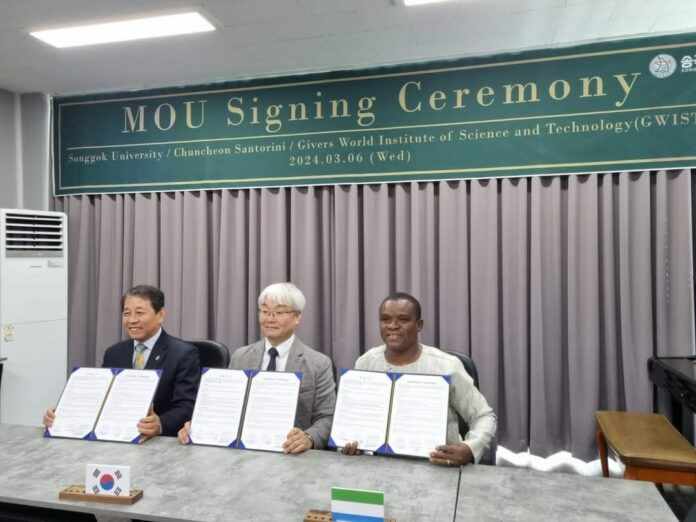Sixty-three years after independence, Kambia remains one of the districts most lacking in established tertiary institutions, even though some have been established recently in Sierra Leone.
However, plans are underway for Kambia to get a modern University of Science and Technology, following the signing of a Memorandum of Understanding between the Givers World Institute of Science and Technology (GWISTEC) in Kambia in partnership with Songkok University of Science and Technology in South Korea and Santorini Gangwon Special Self-Governing Province in South Korea.
The MOU, among other things, anchors on developing each other’s institutions to enhance global social contribution and establish organic solidarity between the three institutions through cooperation.
One of the benefits Sierra Leone will gain from the tripartite partnership is the agreement to establish a University in Sierra Leone, which will record the First Institution of higher learning in Africa empowered by South Korea with the desire to spread to other countries in Africa. The institution will give a lot of scholarships to hundreds of Sierra Leoneans to study in South Korea through Songkok University, especially for those who may study and master the Korean Language. It is glaring that establishing a University in Kambia, North-West Region of Sierra Leone, is an ideal venture because the district had been deprived of a tertiary education system that will enable indigenes of that region and the country at large to get advanced education.
For Kambia to get a University of Science and Technology in Partnership with Songkok University in South Korea is a big boost to the education sector, particularly Sierra Leone, because of President Bio’s ambitious vision for human capital development. Because human capital development is President Bio’s second priority in his government’s Big Five Game Changers, having a tertiary institution in Kambia will boost the president’s vision to improve education in the country. One will consider the move as a drive in the right direction for young people to become educated.
According to the MOU signed by the three partners, the main determination for establishing a partnership between the three institutions is to establish an organic solidarity through cooperation. The three institutions are expected in good faith to implement projects in cooperation and respect for the provisions of both organizations. The primary areas of agreement between the partners are centred on securing a bridgehead for Songkok University to embark on the future development potential of Africa and establishing a family group to attract English-speaking international students. It is also geared towards establishing a branch campus in Africa or expanding the base of the University business through cooperation with other universities in the country. Songkok University operates an online education program, which requires strengthening and expanding its Smart Farm online education program and fostering local operation experts of the smart farm facility in the country, among others.
Be it as it may, the proposed university aims to advance science and technology education that will enhance global competitiveness in all aspects of human development for a better life for Sierra Leoneans. It will also focus on the provision of guidance, advice and information on Science and technology research, education and good professional practice; the establishment and maintenance of virtual and physical institutions in Sierra Leone and relating with like-minded institutions around the world; provision of a forum for discussion and exchange of information to the objective of GWISTEC among others.
In conclusion, essentially, the development of education in Sierra Leone has a very long history, which started with the establishment of Fourah Bay College (FBC) on Friday, 18th February 1827, by the Church Missionary Council (CMS), an Anglican Missionary institution with support from Charles McCarthy for training Africans as school masters, catechists and clergymen. The institution started with six students, including five Sierra Leoneans and one foreign student, Samuel Ajayi Crowther, the slave boy from Nigeria and the first registered student at FBC. Eventually, several institutions emerged with support from Christian missionaries, like the Christian Missionary Society, Wesleyan Mission Society, United Brethren in Christ, and the Roman Catholics, among others. Over time, the Government took over the schools and provided salaries to teachers. In recent times, we have witnessed the emergence of private institutions of higher learning and above all, plans are underway to establish a University of Science and Technology with GWISTEC.


